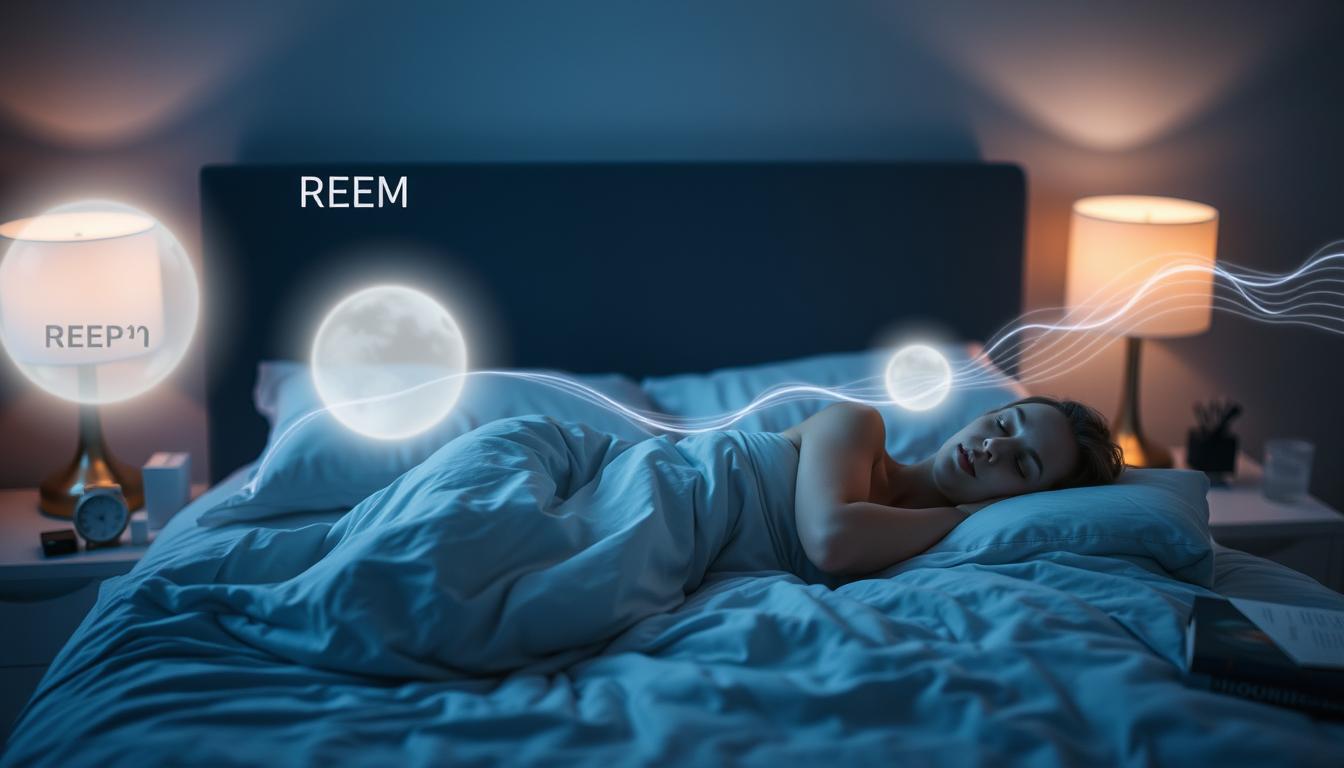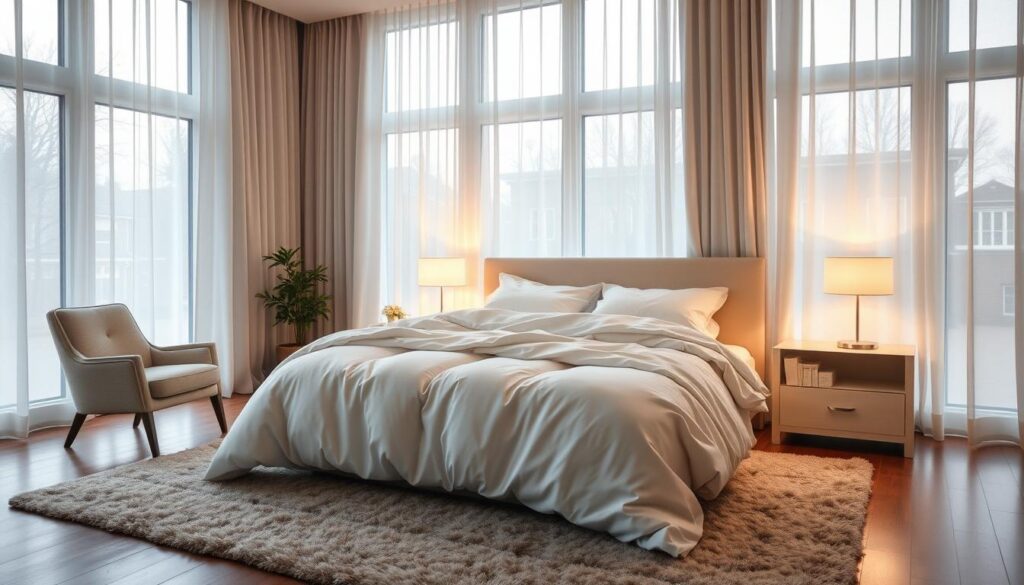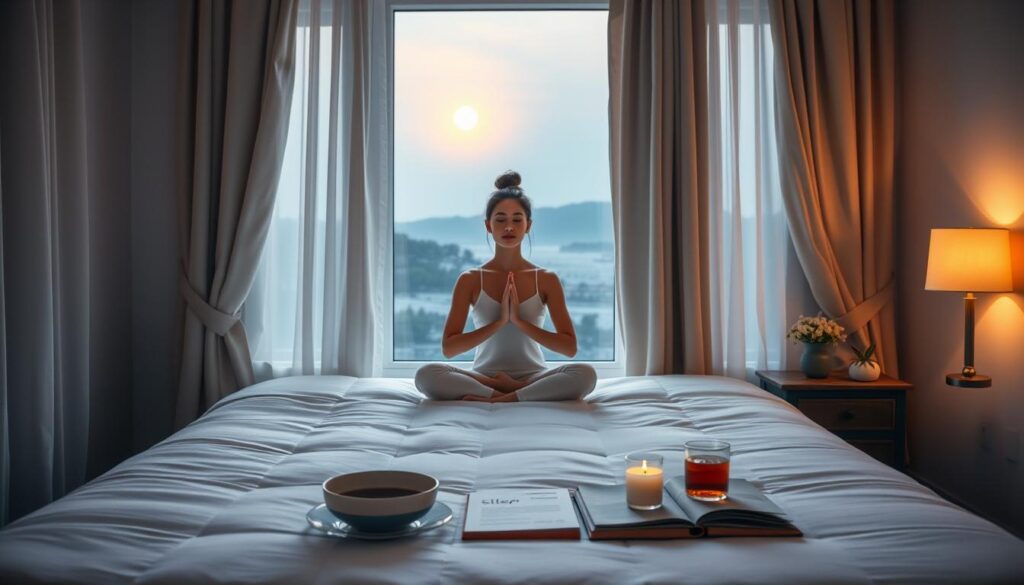Physical Address
304 North Cardinal St.
Dorchester Center, MA 02124
Physical Address
304 North Cardinal St.
Dorchester Center, MA 02124

Ever wonder why you can sleep eight hours yet still feel exhausted? Many people struggle with poor rest despite spending enough time in bed.
I want to explore what truly makes sleep restorative. Our nightly rest cycles between NREM and REM stages multiple times.
Deep sleep happens mostly during the first half of the night. This critical phase repairs your body and strengthens immunity.
Without quality rest, your mental function suffers. Mood swings and health risks like heart disease increase.
Understanding this science transforms how you approach your nightly routine. Proper sleep isn’t just about duration—it’s about depth and quality.
I believe many people underestimate what happens during those quiet night hours. Your body isn’t just shutting down—it’s performing essential maintenance work.
Getting enough deep sleep transforms how you function. It’s when your cells repair themselves and your brain processes memories.
Poor rest quality impacts your entire system. Studies show chronic sleep deprivation increases heart disease risk by 48%.
Your immune system also depends on nightly recovery. Without proper rest, you’re three times more likely to catch colds.
Mental sharpness suffers when you skip quality shut-eye. Problem-solving skills decline and creativity dwindles.
I’ve seen how a consistent sleep schedule changes everything. People who maintain regular bedtimes report better mood stability.
Weight management becomes easier with proper rest. Sleep regulates hormones that control appetite and metabolism.
Athletic performance improves dramatically with good recovery. Reaction times quicken and endurance increases.
Your body clears toxic waste from the brain during deep phases. This nightly cleanup prevents cognitive decline over time.
I cannot overstate sleep’s role in emotional balance. Well-rested people handle stress better and maintain healthier relationships.
Prioritizing sleep isn’t luxury—it’s fundamental to your wellbeing. Everything from your work performance to your long-term health depends on it.
Tomorrow’s productivity begins with tonight’s rest. Make sleep quality your non-negotiable health priority.
Sleep isn’t a single state but a carefully orchestrated series of biological processes. I want to show you what happens during these nightly cycles.
Your body moves through distinct phases that serve different purposes. Each stage contributes to your overall restoration.
Non-REM sleep consists of three progressive stages. They prepare your body for maximum recovery.
Stage 1 lasts about 5-10 minutes as you drift off. Your muscles relax and brain waves begin slowing.
Stage 2 occupies nearly half your total sleep time. Your heart rate drops and body temperature decreases.
Stage 3 represents true deep sleep. This is when physical restoration peaks.
During this phase, your breathing becomes very regular. Blood pressure drops and tissue repair accelerates.
Growth hormone releases primarily during deep sleep. This helps muscle repair and cellular regeneration.
Adults typically spend 10-20% of their night in this critical stage. This percentage naturally decreases with age.
REM sleep usually begins about 90 minutes after you fall asleep. Your brain becomes highly active during this phase.
Your eyes move rapidly behind closed eyelids. Most dreaming occurs during REM periods.
This stage plays a vital role in memory consolidation. It helps organize and store daily experiences.
Emotional regulation also depends on sufficient REM sleep. It processes feelings and reduces next-day reactivity.
Each sleep cycle lasts approximately 90 minutes. You typically experience 4-6 cycles nightly.
Early cycles contain more deep sleep. Later cycles feature longer REM periods.
This natural progression explains why timing matters. Interrupted sleep disrupts this careful balance.
| Sleep Stage | Duration | Brain Waves | Primary Functions |
|---|---|---|---|
| NREM Stage 1 | 5-10 minutes | Theta waves | Light sleep, transition to sleep |
| NREM Stage 2 | 20-30 minutes per cycle | Sleep spindles | Body temperature drop, heart rate decrease |
| NREM Stage 3 (Deep Sleep) | 20-40 minutes early cycles | Delta waves | Physical restoration, hormone release |
| REM Sleep | 10-60 minutes later cycles | Mixed frequency | Memory processing, emotional regulation |
Understanding these stages helps you appreciate sleep’s complexity. Each phase contributes to your waking vitality.
Your daily performance directly connects to nightly sleep architecture. Learning and mood regulation depend on complete cycles.
Now you see why sleep quality matters beyond simple duration. This knowledge helps you improve sleep through better habits.
I often notice people focus on fancy sleep gadgets while ignoring the most powerful tool available. Your daily routine holds the key to truly restorative nights.
Establishing a regular pattern synchronizes your body’s internal clock. This consistency creates the foundation for all other sleep improvements.
Your body operates on a natural 24-hour cycle called circadian rhythm. This internal clock regulates when you feel alert and when you feel sleepy.
Light exposure plays a crucial role in setting this rhythm. Morning sunlight tells your brain to start the day. Evening darkness signals preparation for rest.
Maintaining a fixed sleep schedule strengthens this natural regulation. Your body learns to anticipate sleep and waking times.
This consistency helps you fall asleep faster and experience deeper rest. You’ll likely wake feeling refreshed without morning grogginess.
Many people sabotage their weekly progress by sleeping late on weekends. This “social jetlag” confuses your internal clock.
Shifting your bedtime by just two hours disrupts circadian regulation. Monday morning becomes much harder when your rhythm is off.
Research shows irregular patterns reduce sleep quality significantly. You might spend enough time in bed but get poorer rest.
Stick to your schedule within 30 minutes every day. This small commitment pays off with better energy all week.
Your consistent sleep schedule becomes the anchor for all other healthy habits. It’s the simplest way to improve sleep quality dramatically.
Plan your activities around protecting this routine. Your body will thank you with deeper, more restorative rest each night.
Your surroundings play a crucial role in how well you rest each night. I’ve seen many people transform their sleep quality simply by adjusting their environment.
Creating a dedicated space for relaxation supports healthy sleep patterns. Your bedroom should feel like a true sanctuary.

Light exposure directly impacts your circadian rhythm. Darkness triggers melatonin release, preparing your body for rest.
Use blackout curtains to eliminate outside light pollution. These special curtains create total darkness for optimal sleep conditions.
Avoid screens for at least two hours before bedtime. Blue light from devices inhibits natural melatonin production.
Morning sunlight exposure helps reset your internal clock. Open those curtains first thing to signal wakefulness.
Your body temperature naturally drops during sleep. A cool room supports this biological process.
Keep your bedroom around 67°F (19.4°C) for ideal conditions. This temperature range facilitates falling asleep faster.
Your body works less to regulate its temperature. You experience deeper, more uninterrupted rest throughout the night.
Unexpected sounds can disrupt your sleep cycles. Even if you don’t fully wake, noise affects sleep quality.
White noise machines mask disruptive environmental sounds. They create a consistent auditory backdrop for better rest.
Earplugs offer another effective solution for light sleepers. They block sudden noises that might interrupt your sleep.
Soft, calming music can also promote relaxation. Choose instrumental tracks without lyrics for best results.
These environmental adjustments support excellent sleep hygiene. They help maintain consistent sleep even during challenging times.
Your bedroom becomes a true sanctuary dedicated to restoration. Small changes create significant improvements in how you feel each morning.
I’ve discovered that what you do during waking hours directly impacts your nightly recovery. Daily choices about food, movement, and substances create either a path to deep rest or a barrier to quality slumber.
Caffeine stays in your system much longer than most people realize. This stimulant blocks adenosine receptors that naturally make you feel sleepy.
Consuming it late in the day masks your body’s natural tiredness signals. You might still fall asleep but experience fragmented rest throughout the night.
I recommend a strict cutoff time—at least 8-10 hours before your usual bedtime. Morning coffee works with your natural rhythm rather than against it.
Many people mistakenly believe nightcaps help them sleep. Alcohol initially acts as a sedative, helping you doze off faster.
However, your body must metabolize it during the night. This process causes frequent awakenings and reduces crucial REM phases.
You might spend enough time in bed but wake feeling unrefreshed. True sleep quality requires avoiding alcohol close to bedtime.
Your final meal timing significantly affects overnight digestion. Heavy evening meals can cause discomfort and acid reflux.
I suggest finishing dinner at least two hours before your bedtime. This allows partial digestion before lying down.
Physical activities greatly improve sleep when timed correctly. Morning or afternoon workouts support natural circadian regulation.
Evening exercise too close to bedtime can overstimulate your system. Your body needs time to wind down after intense movement.
These daily habits form the foundation of excellent sleep health. Small adjustments to your schedule create significant improvements in how you feel each morning.
Creating a consistent pre-sleep ritual can dramatically transform your ability to fall asleep easily. I’ve found that dedicating the final hour before bed to calming activities signals your body that it’s time to rest.
This wind-down period helps reduce anxiety and prepares your mind for quality sleep. Your brain needs this transition from daytime alertness to nighttime relaxation.

This powerful breathing technique quickly reduces stress and anxiety. It works by activating your parasympathetic nervous system.
Follow these simple steps:
Repeat this cycle four times. The extended exhale triggers relaxation responses throughout your body.
Practice this method during your bedtime routine. It helps quiet racing thoughts that might keep you awake.
CBT-I addresses the thoughts and behaviors affecting your sleep. It’s considered the gold standard for chronic sleep issues.
Key principles include:
These techniques help reset your sleep-wake regulation. They create stronger associations between your bed and restful sleep.
Many people see improvement within weeks of consistent practice. The methods address both the mental and physical aspects of sleep difficulties.
Incorporate relaxing activities like reading or soft music during your wind-down time. Avoid stimulating content or bright screens during this period.
Your evening routine should signal that sleep time approaches. Consistency helps regulate your internal clock for better rest.
These techniques work together to reduce nighttime anxiety. They create conditions that support falling asleep naturally and staying asleep through the night.
I’ve observed countless individuals struggle with racing thoughts when they finally lie down. Mental chatter often becomes the biggest barrier to quality slumber.
Your mind needs to unwind just like your body. Learning to quiet anxious thoughts transforms your entire sleep experience.
Putting worries on paper creates mental space for relaxation. This simple practice helps clear your mind before bed.
I recommend keeping a notebook specifically for evening reflection. Write down anything causing anxiety or occupying your thoughts.
This process serves two important purposes:
Spend just five minutes each night with this practice. You’ll notice significantly easier transitions into rest.
Meditation trains your brain to release tension and focus peacefully. Regular practice builds mental resilience against daily stressors.
Begin with short sessions of just five minutes. Focus on your breath while allowing thoughts to pass without judgment.
Guided meditation apps provide excellent support for beginners. They offer specific programs designed for sleep preparation.
Mindfulness throughout your day also improves nighttime calm. Notice moments of stress without becoming overwhelmed by them.
These practices rewire your brain’s response to anxiety. They create space between triggers and reactions.
With consistent effort, you’ll find easier transitions into deep slumber. Your mind will learn to associate bed with peace rather than worry.
I’ve seen how combining these approaches transforms sleep quality. Consistency matters most when implementing new habits.
Patience plays a vital role in this process. Small daily changes create significant improvements over time.
When persistent problems continue despite your efforts, seek professional guidance. Conditions like sleep apnea require specialized evaluation.
Doctors might recommend sleep studies or targeted therapies. Getting proper help ensures you address underlying issues.
These strategies work together to support restorative rest. You’ll start waking up feeling refreshed and energized.
Remember that quality sleep enhances every aspect of life. Prioritize these tips to transform your nightly rest.